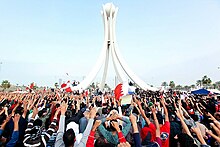Matar Matar
In 2010, he won with a large margin in the Parliamentary election, becoming the youngest of all MPs and representing the country's largest constituency.
When the Bahraini uprising started in early 2011, Matar joined the protests and gave several interviews to international media.
He returned to Bahrain following a reform process initiated by King Hamad who succeeded his father, Isa bin Salman Al Khalifa.
[5] In October 2010, Matar was successfully nominated by Al Wefaq to the parliamentary election, becoming the youngest Member of Parliament.
[2] In December, the then-U.S. Secretary of State Hillary Clinton was on a visit to Bahrain when Matar asked her to "use America’s influence to reverse a sharp decline in civil rights in the kingdom".
[10] Beginning in February 2011, Bahrain saw sustained pro-democracy protests, centered at the Pearl Roundabout in the capital of Manama, as part of the wider Arab Spring.
[1][8] In February, he and 17 other Al Wefaq MPs (the largest bloc) submitted their resignations in protest against the government crackdown on anti-government demonstrations.
[8] On 2 May, following a car chase,[19] Matar was arrested by plain-clothed and masked security forces while he was accompanied by his wife, his family said.
[16] His wife Amal said in an interview with AJE: "We were chased in the street by masked men in plain clothes with machine guns.
[16] According to "media sources and human rights organizations", he was kept in solitary confinement until 12 June,[1][21] with a family visit allowed ten days later.
[26] In a testimony to Amnesty International, he said: I was ill-treated by the security forces in Bahrain and held in solitary confinement for 45 days.
They added that Matar was allowed to contact his family and lawyer, and that his "legal safeguards were ensured" according to local law.
[30] They however did not address the allegations of mistreatment nor did they provide other information requested by the Office of the United Nations High Commissioner for Human Rights such as the results of investigation and medical examinations.
Against the wishes of his lawyer, the judge refused to adjourn Matar's trial saying it was a minor case that did not warrant his attendance.
[39] The Inter-Parliamentary Union expressed concern that by October 2012, authorities had not started prosecuting those behind the alleged mistreatment of Matar and Fairooz.
[31] Amnesty International expressed its concern on the arrest of Matar and Fairooz and asked authorities to protect them from ill-treatment.
"These latest arrests of the two Al Wefaq parliamentarians fit a pattern of masked men abducting Bahraini citizens who happen to have opinions critical of the government," said Joe Stork of HRW.
[42] American scholars John Farmer, Jr. and Michael Bronner wrote an opinion piece in The Washington Post asking the United States to push for the release of Matar.
[43] Following his release, Matar continued his pro-democracy activities, authoring a number of book chapters and articles on the situation in Bahrain and testifying before a United States Congress human rights commission.

